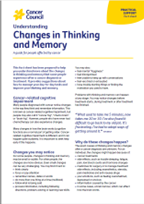- Home
- About Cancer
- Managing side effects
- Changes in thinking and memory
- Managing thinking and memory changes
Managing thinking and memory changes
There are a number of things you can do to cope with cognitive problems, improve your wellbeing and manage daily life.
Learn more about:
Overview
Keep a diary of the differences you notice, including the time of day and what you were doing. This can make it easier to plan your day and may be useful when you talk with your health care team.
See below for a list of practical ways you can adjust your daily routine, involve other people, maintain a healthy lifestyle, and improve your thinking and memory.
Cognitive rehabilitation and brain training
If thinking and memory problems continue to affect your daily life, ask your health care team if cognitive testing and cognitive rehabilitation could be right for you.
Cognitive rehabilitation is a type of brain training that can help with all levels of thinking and memory changes. During cognitive rehabilitation, you will learn specially planned brain exercises to help with symptoms and management. This can be done by a neuropsychologist (specialist psychologist) or a specially trained occupational therapist.
Most of the time you need to pay a private fee for cognitive rehabilitation.
An occupational therapist who specialises in memory and concentration problems may also be able to help with strategies for day-to-day life. Ask your health care team for more information or search online for occupational therapy services in your area.
Ways to manage change
The following suggestions may help you with managing changes in thinking and memory.
Adjust your daily routine
- Write things down: keep a to-do list or take notes.
- Use a diary or smartphone features, such as reminders, alarms and lists.
- Set times each day to check your to-do lists and reminders.
- Focus on one thing at a time (try not to multitask).
- Avoid distractions. For example, let your phone go to voicemail and listen when you’re ready.
- Pick a specific place to put objects such as your keys, rings or phone, so they are easier to find.
- Ask your pharmacist about a medicine organiser or blister pack (e.g. Webster-pak).
- Pace yourself and include rest breaks to recharge after mentally demanding tasks.
- Do focused tasks when you feel fresher.
Involve other people
- If you feel comfortable, tell family, friends and colleagues what is going on – this can prevent misunderstandings.
- Speak to your employer about how they can support you to come back to work, or changes they can make to help.
- Take a support person to appointments or treatment. They can help to remember what is said, or speak for you if you want them to.
- Talk to your health care team about how you are feeling. They can assess if you have other concerns such as depression.
- Health professionals can help you manage your symptoms or daily challenges. Talk to your treatment team or your GP about referral to a neuropsychologist, clinical psychologist or occupational therapist. You may be able to access support through the hospital system or get a Medicare rebate.
Maintain a healthy lifestyle
- Eat healthy, nutritious foods, including lots of fruits and vegetables.
- Aim to get at least 7–8 hours of sleep each night and rest when tired.
- Do some physical exercise or stretching. A mix of aerobic and strength training may help improve your symptoms.
- Consider working with a physiotherapist or exercise physiologist to make exercise part of your lifestyle.
- Minimise stressful activities as much as possible.
- Try meditation or relaxation to reduce stress and worries. Listen to our meditation and relaxation exercises.
Improve your thinking and memory
- During conversation, focus carefully and repeat what has been said to you out loud.
- Add meaning to information you need to remember, e.g. picture someone called Robyn with a robin bird above their head.
- Break down new information into smaller chunks, e.g. remember 2507000 by thinking of 2507 as Christmas in July, then 000 as the emergency phone number.
- Keep your mind active with crosswords, puzzles or joining in with TV game shows.
- Learning a new skill, language or musical instrument can keep your brain active, help it form new connections and strengthen existing ones.
- Try doing something creative, like art or crafts.
Online brain training program
Brain training programs that you do online may also be helpful. These include brain exercises that you practise regularly for a short time. Most programs offer a free trial, but to continue using the programs you usually need to pay. Search online or ask your health care team to recommend a program.
I just felt edgy all the time. And I thought, ‘Oh is that depression? Is it stress?’ But I think it was just that the required concentration to do what would be very normal tasks was exhausting because you used so much more energy to do the same task.
ANNE
Podcast: Brain Fog and Cancer
Listen to more episodes from our podcast for people affected by cancer
More resources
Prof Janette Vardy, Medical Oncologist, Sydney Cancer Survivorship Centre, Concord Repatriation General Hospital, University of Sydney, NSW; Dr Heather Green, Clinical Psychologist and Health Psychologist, Griffith University, Gold Coast, QLD; Dr Adam Walker, Director, Laboratory of ImmunoPsychiatry, Neuroscience Research Australia and University of New South Wales, NSW; Brooke Russell, Principal Occupational Therapist, WA Cancer Occupational Therapy, WA; Sarah Ramsdale, Cancer Survivorship Nurse, ICON Cancer Centre Warrnambool, VIC; Johanna Jordaan, Consumer; Lesley, 13 11 20 Consultant, Cancer Council, WA.
View the Cancer Council NSW editorial policy.
View all publications or call 13 11 20 for free printed copies.

